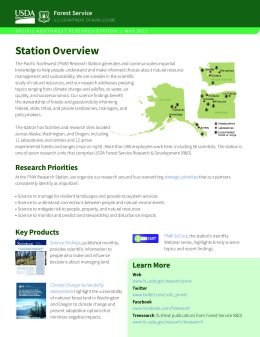About the Station

Our headquarters in Portland, Oregon.
The Pacific Northwest (PNW) Research Station is a leader in the scientific study of natural resources. We generate and communicate impartial knowledge to help people understand and make informed choices about natural resource management and sustainability. The station has 11 laboratories and research centers in Alaska, Oregon, and Washington as well as 12 active experimental forests, ranges, and watersheds.
The PNW Research Station is an integral component of USDA Forest Service Research and Development (R&D), which is the most extensive natural resources research organization in the world. Forest Service R&D comprises five regional research stations, the Forest Products Laboratory, and the International Institute of Tropical Forestry. These research facilities, complemented by a network of 80 experimental forests, are strategically located to reflect the diversity of natural resources across the country.
Areas of Scientific Expertise
Fire, Fuels, and Smoke: We study how wildland fire interacts with biophysical and socioeconomic components of landscapes. This information can be used to inform fire management, optimize active management, and mitigate and reduce wildfire risk.
Forest Monitoring and Assessment: We conduct fundamental and applied research to understand and predict changes in forest landscapes across all ownerships. We develop innovative techniques for long-term monitoring, detecting change, and predicting outcomes following forest management and disturbances.
Forest and Range Ecology and Management: We generate information that can be used to maintain, restore, and enhance ecological processes, ecosystem services, and forest and rangeland resilience as the climate changes and fire and other disturbance regimes shift.
People, Natural Resources, and Economics: The knowledge we generate about human interactions with nature, government policies, and decisionmaking processes informs decisions about collaborative governance, forest products, human health, jobs, recreation, urban design, and wildfire risk reduction.
Watershed and Aquatic Sciences: We study ecological and hydrological patterns and processes that characterize watershed and aquatic-dependent ecosystems. Our findings are critical to developing watershed-scale assessments, restoring riparian areas, and developing strategies to improve resilience and conserve aquatic-dependent plants and animals.
Wildlife Ecology: We study how wildlife respond to climate change and other stressors. We also study how wildlife contribute to ecosystem resilience and sustainability. Our findings inform management strategies for species that are ecologically, economically, and culturally important, including those that are rare, little known, and species of management concern.
Science Support
The station’s scientific expertise is supported by science professional and technical staff, business operations, and communication professionals. The work by assistants, budget analysts, facilities maintenance, grant and agreement specialists, technicians, and many others is essential to generating scientific information, developing tools, making it all accessible to those who need it, and communicating the work to the public.
Station History
The station was officially founded in 1925 as the Pacific Northwest Forest and Range Experiment Station, but Forest Service research in the region had begun more than a decade earlier in Wind River, Washington. Read more about the history of the Pacific Northwest Research Station.
Research Centers
-
Center or Group
-
Center or Group





